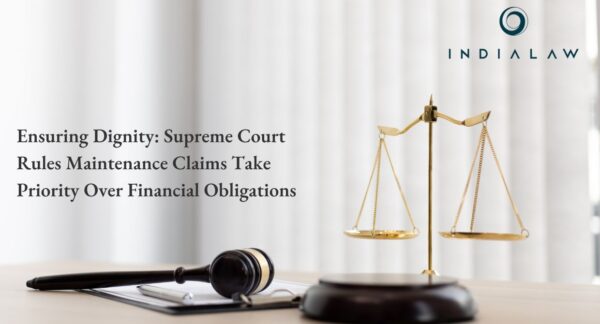Allottee who are part of Monthly Assured Return Plan agreement under a real estate project, cannot be considered a distinct class


In the case of Rita Malhotra and Anr. Vs Orris Infrastructure Pvt. Ltd., the National Company Appellate Tribunal vide order dated 02.07.2024 held that the appellants do not cease to be an “allottee” merely because they are part of an (Monthly Assured Return) MRA plan, they must comply with the threshold criteria of Section 7 (1) of the IBC
Brief Facts of the Case:
In the present case, the corporate debtor i.e., the developer entered into an MOU with the Appellants on 24.04.2010 for providing Monthly Assured Returns (“MAR”). That the clause Nos. 2, 4, 5 and 6 of the said MOU stipulated MAR Payments for 36 months after the completion of the building or until the office space is leased out on completion, whichever is earlier.
That the Appellant had paid the entire consideration of Rs. 29.98 lakhs and were consequently discharged from their part of their obligation. However, the payments of MAR as per the MOU was not complied by the Corporate Debtor.
In view of the aforesaid a Section 7 application was filed by the Appellants. However, in light of a settlement deed dated 06.03.2019, the Section 7 application was disposed off by the Adjudicating Authority with liberty to revive the same in case of default by the Corporate Debtor.
That due to further defaults, default notices were issued and subsequently the Section 7 Application was revived. The Hon’ble NCLT, New Delhi vide order dated 19.09.2023 dismissed the Section 7 Application.
The Present appeal is filed challenging order dated 19.09.2023 passed by the NCLT New Delhi Bench.
Contentions of the Parties
The Counsel appearing for the Appellant contended that the application was filed by the Appellant not in the capacity of “allottees” of the said project but under the terms of the MOU dated 24.04.2010. It was further contended that the appellants are not claiming the amount paid as consideration by them as allottees but the appellants are rather claiming the amount which had accumulated and continue to accumulate under the MAR plan. It was asserted that the MAR plan was independent of the allotment. The Appellant has further relied on the Judgment of the NCLAT in Nikhil Mehta and Sons Vs. AMR Infrastructure Ltd in CA(AT) (Ins) No.07 of 2017 wherein it was held that a recipient under an identical assured return investment scheme is a Financial Creditor in terms of the said agreement and not as “allottees”.
The Counsel for the Respondent contended that the present application was filed with a mala fide intention to extort money from the Corporate Debtor. Reliance was placed on Mobilox Innovation Pvt Ltd Vs Kirusa Software Pvtwherein, it was clearly held that IBC is not a substitute to a recovery forum.
The Counsel for the Respondent further contended on the maintainability of the present application. It was contended that the during the pendency of the present application, Section 7 of IBC was amended on 13.03.2020 w.e.f. 28.12.2019.
By the virtue of the amended provision, financial creditor who are allottees numbering not less than 100 or 10% of such allottee whichever is less in a real estate project could avail the remedy under Section 7. In the term of the Judgment of the Hon’ble Supreme Court in Manish Kumar vs Union of India, the appellants were required to amend the present section 7 application within the stipulated time frame given to conform to the second proviso of the amended section 7. Since the necessary modification were not done, it was contended that the present application was liable to be dismissed as not maintainable.
The counsel for the Appellant contended that, the appellants have not approached the Tribunal as “Allotees”. The present application was filed on account of a default arising out of the agreement for MAR plan. Thus, it was not affected by the amendment to the Section 7.
Decision of the NCLAT
The Hon’ble NCLAT addressed the First question: whether commercial space or unit allottees are covered under the definition of “allottee” under the RERA Act to initiate CIRP under Section 7 of IBC. The Hon’ble NCLAT observed that on perusal of the definition clause under RERA Act, a commercial space/unit allottee is covered under the purview of “allottees” under RERA Act. By the virtue of Explanation (ii) to Section 5(8)(f) of IBC, the same interpretation of the “allottees” is to be adopted under IBC. Thus, it observed that the adjudicating authority was correct to state that a commercial space/ unit allotted to the Assured Returns Class of Creditors falls under the ambit of an “allottee”. It also affirmed that the Adjudicating authority was correct to note that the Nikhil Mehta Judgment has nowhere observed that assured returns class of creditors in a particular project don’t come under the definition of “allottees”.
Thus, it further observed that the Appellants happen to be part of the Assured Return Class of Creditors, they continue to belong to the set of “allottees” and thus are governed by the threshold provided by the second proviso of Section 7(1) of IBC. Thus, the NCLAT held that the Appellants do not stop being “allottees” just by the fact that they are part of a MAR plan. While rejecting the claim of the Appellants that they are a distinct class, the Hon’ble NCLAT held that Appellants must comply with the requirements demarked by Section 7 of IBC.
Conclusion
The appellants do not cease to be an “allottee” merely because they are part of MAR plan or cannot be considered a distinct class whereby, they are not required to comply with the provisions of section 7. NCLAT upheld the decision of Adjudicating authority and dismissed the Appeal.




